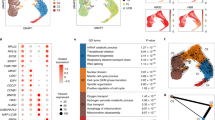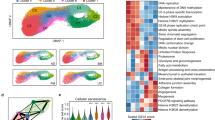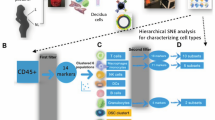Impact
-
This study reveals the effects of maternal gestational diabetes mellitus (GDM) on the transcriptome of CD71+ erythroid cells (CECs) in cord blood.
-
It highlights the role of CECs in immunosuppressive function and identifies potential mechanisms linking GDM to adverse outcomes in offspring.
-
This understanding might lead to improved strategies for managing and preventing adverse outcomes in infants born to mothers with GDM.
This is a preview of subscription content, access via your institution
Access options
Subscribe to this journal
Receive 14 print issues and online access
$259.00 per year
only $18.50 per issue
Buy this article
- Purchase on Springer Link
- Instant access to full article PDF
Prices may be subject to local taxes which are calculated during checkout

Similar content being viewed by others
Data availability
The raw scRNA-seq datasets in the FASTQ format with filtered barcode matrix have been uploaded to the Gene Expression Omnibus (GEO) database: GSE212309. Other data generated and/or analyzed in this study are available on reasonable request from the corresponding author.
References
Yew, T. W. et al. A Randomized Controlled Trial to Evaluate the Effects of a Smartphone Application-Based Lifestyle Coaching Program on Gestational Weight Gain, Glycemic Control, and Maternal and Neonatal Outcomes in Women With Gestational Diabetes Mellitus: The SMART-GDM Study. Diabetes Care 44(2), 456–463 (2021).
Ye, W. et al. Gestational diabetes mellitus and adverse pregnancy outcomes: systematic review and meta-analysis. BMJ 377, e067946 (2022).
Elahi, S. et al. Immunosuppressive CD71+ erythroid cells compromise neonatal host defence against infection. Nature 504(7478), 158–162 (2013).
Delyea, C. et al. CD71(+) Erythroid Suppressor Cells Promote Fetomaternal Tolerance through Arginase-2 and PDL-1. J. Immunol. 200(12), 4044–4058 (2018).
Elahi, S. et al. CD71(+) Erythroid Cells in Human Neonates Exhibit Immunosuppressive Properties and Compromise Immune Response Against Systemic Infection in Neonatal Mice. Front. Immunol. 11, 597433 (2020).
Xu, C. et al. Single-cell transcriptomic analysis identifies an immune-prone population in erythroid precursors during human ontogenesis. Nat. Immunol. 23(7), 1109–1120 (2022).
Bozorgmehr, N. et al. CD71(+) erythroid cells suppress T-cell effector functions and predict immunotherapy outcomes in patients with virus-associated solid tumors. J. Immunother. Cancer 11(5), e006595 (2023).
Dunsmore, G. et al. Erythroid Suppressor Cells Compromise Neonatal Immune Response against Bordetella pertussis. J. Immunol. 199(6), 2081–2095 (2017).
Elahi, S. & Mashhouri, S. Immunological consequences of extramedullary erythropoiesis: immunoregulatory functions of CD71(+) erythroid cells. Haematologica 105(6), 1478–1483 (2020).
Elahi, S. Neglected Cells: Immunomodulatory Roles of CD71(+) Erythroid Cells. Trends Immunol. 40(3), 181–185 (2019).
Dunsmore, G. et al. Lower Abundance and Impaired Function of CD71+ Erythroid Cells in Inflammatory Bowel Disease Patients During Pregnancy. J. Crohn’s Colitis 13(2), 230–244 (2019).
Funding
This study was supported by the National Natural Science Foundation of China (grant no. 82070812), the Science and Technology Innovation Program of Hunan Province(2020RC4044).
Author information
Authors and Affiliations
Contributions
All authors contributed to the manuscript preparation. M.Y. and X.L. codesigned the topics and research framework. M.Y., Y.Z. and X.Y.L contributed to the data analysis. M.Y. wrote the manuscript. X.L. revised the manuscript. All authors have read and agreed to the published version of the manuscript.
Corresponding author
Ethics declarations
Competing interests
The authors declare no competing interests.
Additional information
Publisher’s note Springer Nature remains neutral with regard to jurisdictional claims in published maps and institutional affiliations.
Supplementary information
Rights and permissions
Springer Nature or its licensor (e.g. a society or other partner) holds exclusive rights to this article under a publishing agreement with the author(s) or other rightsholder(s); author self-archiving of the accepted manuscript version of this article is solely governed by the terms of such publishing agreement and applicable law.
About this article
Cite this article
Yin, M., Zhang, Y., Li, X. et al. Unveiling the impact of maternal gestational diabetes mellitus on cord blood CD71+ erythroid cell transcriptome. Pediatr Res (2024). https://doi.org/10.1038/s41390-024-03139-x
Received:
Revised:
Accepted:
Published:
DOI: https://doi.org/10.1038/s41390-024-03139-x



